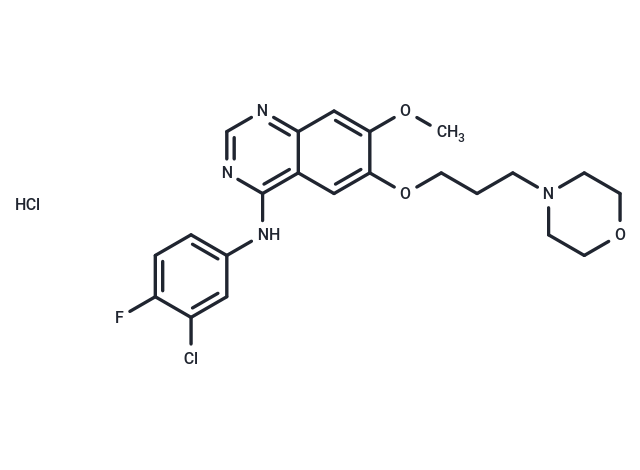Shopping Cart
- Remove All
 Your shopping cart is currently empty
Your shopping cart is currently empty

Gefitinib hydrochloride (ZD-1839 hydrochloride) is an orally active selective and potent tyrosine kinase (EGFR) inhibitor. Gefitinib hydrochloride exhibits antitumor activity, selectively inhibits EGF-stimulated tumor cell growth, induces cellular autophagy, improves lung dysfunction, and inhibits inflammation. Gefitinib hydrochloride has antitumor activity, selectively inhibits EGF-stimulated tumor cell growth, induces cellular autophagy, ameliorates lung dysfunction, and inhibits the progression of inflammation and fibrosis.

| Pack Size | Price | Availability | Quantity |
|---|---|---|---|
| 50 mg | $33 | In Stock | |
| 100 mg | $47 | In Stock |
| Description | Gefitinib hydrochloride (ZD-1839 hydrochloride) is an orally active selective and potent tyrosine kinase (EGFR) inhibitor. Gefitinib hydrochloride exhibits antitumor activity, selectively inhibits EGF-stimulated tumor cell growth, induces cellular autophagy, improves lung dysfunction, and inhibits inflammation. Gefitinib hydrochloride has antitumor activity, selectively inhibits EGF-stimulated tumor cell growth, induces cellular autophagy, ameliorates lung dysfunction, and inhibits the progression of inflammation and fibrosis. |
| Targets&IC50 | non-transformed cells:20 nM, GLC82 cells:2 μM, Calu3 (cells):2 μM |
| In vitro | Gefitinib hydrochloride (0.01-0.1 mM) increased phosphotyrosine loading of the receptor by inducing EGFRvIII dimerization, enhanced ERK signaling, and stimulated cell proliferation and anchorage-independent growth, especially upon prolonged exposure of EGFRvIII-expressing cells. In contrast, Gefitinib hydrochloride (1-2 mM) significantly reduced phosphotyrosine loading of EGFRvIII and inhibited EGFRvIII-mediated proliferation and anchorage-independent growth. [1] Gefitinib hydrochloride inhibited monolayer growth of non-transformed cells driven by EGF with an IC50 of 20 nM. [2] Gefitinib hydrochloride also inhibited the proliferation of CALU-3 and GLC82 cells with an IC50 of 2 μM. [3] |
| In vivo | Gefitinib hydrochloride (150 mg/kg, orally) in combination with metformin significantly inhibited the growth of tumor xenografts formed by subcutaneous transplantation of H1299 or CALU-3 GEF-R cells in nude mice. [3] In rats treated with radiation therapy, Gefitinib hydrochloride exacerbated the inflammatory response in the lungs, including the infiltration of inflammatory cells and the increase of pro-inflammatory factors, whereas Gefitinib hydrochloride served to slow down the fibrotic remodeling of the lungs by inhibiting the proliferation of lung fibroblasts. [4] |
| Alias | ZD-1839 hydrochloride, ZD1839 hydrochloride |
| Molecular Weight | 483.36 |
| Formula | C22H25Cl2FN4O3 |
| Cas No. | 184475-55-6 |
| Smiles | Cl.FC1=CC=C(C=C1Cl)NC=2N=CN=C3C=C(OC)C(OCCCN4CCOCC4)=CC32 |
| Relative Density. | no data available |
| Storage | store at low temperature | Powder: -20°C for 3 years | In solvent: -80°C for 1 year | Shipping with blue ice. | |||||||||||||||
| Solubility Information | DMSO: < 0.1 mg/mL (insoluble) H2O: 4 mg/mL (8.28 mM), Sonication is recommended. | |||||||||||||||
Solution Preparation Table | ||||||||||||||||
H2O
| ||||||||||||||||

Copyright © 2015-2025 TargetMol Chemicals Inc. All Rights Reserved.